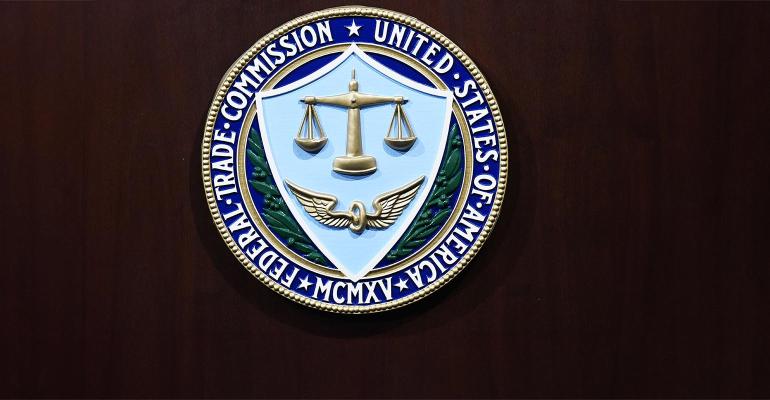(Bloomberg) -- The US Federal Trade Commission voted Tuesday to adopt a near-total ban on non-compete provisions that prohibit workers from switching jobs within an industry, a rule the Chamber of Commerce vowed to immediately challenge in court.
The high-stakes legal showdown comes three years after President Joseph Biden signed an executive order encouraging the FTC to limit non-compete agreements, which affect roughly one in five Americans.
“Robbing people of their economic liberty also robs them of all sorts of other freedoms,” Chair Lina Khan said Tuesday. Arguing that the FTC lacks “rulemaking authority requires ignoring the most straightforward reading of the” law.
“We need to be honoring what courts have said over what courts in the future might say,” she added.
The antitrust and consumer protection agency voted 3-2 to issue a final rule Tuesday after a nearly hour-long debate in an open meeting of the FTC’s five commissioners. The proposal would ban most new non-compete agreements including those of senior executives.
Existing non-competes for executives who earn more than $151,164 a year in a “policy making position” can remain in place.
Existing non-competes with lower-level workers would become unenforceable after the rule goes into effect in six months. The agency estimated that it would increase US earnings by at least $400 billion over the next 10 years. The rule wouldn’t apply to employees of not-for-profit entities or franchises.
The Chamber of Commerce, the nation’s largest business lobby, earlier told reporters it plans to sue over the rule as soon as Wednesday.
The Investment Adviser Association last year challenged the proposal, noting that it would likely result in unintended negative consequences for employers and employees, particularly in the case of investment advisors. In its comments on the proposal, the IAA explained that investment advisors use reasonable non-solicitation agreements, non-disclosure agreements, and non-compete clauses in their employment agreements for several important reasons, including to meet their regulatory obligations and protect their businesses, employees and clients.
Pushback from the IAA and others was at least partially responsible for the compromise that allowed existing non-competes among certain executives.
Union Backing
The FTC first proposed a non-compete ban in January 2023, arguing the restrictions unfairly block workers from switching jobs and undermine labor competition. The proposal has the backing of labor organizations AFL-CIO and the Service Employees International Union, Democratic senators and attorneys general from California, Illinois and 17 other states. Of the 26,000 public comments the FTC received about the proposal, the agency said that 25,000 of them were in support of a ban.
Read more: FTC Proposes a Ban on Non-Compete Contracts for Employees
But business groups oppose the ban, arguing that it’s overly broad and limits the ability of companies to protect confidential information.
Tuesday’s vote fell along partisan lines with the FTC’s three Democrats in favor and the agency’s Republicans opposed. Melissa Holyoak, the former solicitor general of Utah who joined the agency last month, said she was opposed to the rule because there was “no clear congressional authorization” for the FTC to issue it. Republican Andrew Ferguson also voted against the rule, saying he was sympathetic to the policy in the rule but doesn’t believe courts will uphold the FTC’s rulemaking authority.
“The administrative state cannot legislate because Congress declines to do so,” Ferguson said.
In a call with reporters Monday, the Chamber’s Chief Policy Officer Neil Bradley said the FTC doesn’t have the authority to issue the rule.
‘Micromanaging’ Economy
The rule “opens up a Pandora’s box where this commission or future commissions could be literally micromanaging every aspect of the economy,” Bradley said. “Agencies can’t exercise authority that Congress hasn’t given them. Congress has not given the FTC the ability to write regulations with respect to competition.”
The agency’s Democrats, however, maintain that the FTC does have authority to issue rules defining unfair methods of competition. The final rule also rejected the idea that the agency doesn’t have the authority to issue the rule because it represents a “major question,” citing a 1973 case that upheld the agency’s rulemaking authority.
The Supreme Court’s conservative majority has shown deep skepticism toward what it views as agency overreach. In a 2022 case involving efforts to stifle greenhouse gas emissions from power plants, a sharply divided court said regulators must have clear congressional authorization before acting on “major questions.”
The last time the FTC issued a standalone rule defining an unfair method of competition was in 1968, known as the Men and Boy’s Tailored Clothing Rule. The rule, repealed in 1994, required clothing companies to provide equal treatment in promotions to all sellers. The agency has issued dozens of other rules that rely both on its unfair methods of competition authority and its ability to define unfair or deceptive practices.
“The FTC has some good arguments on why this isn’t a major question but a topic that fits comfortably in its authority,” said Sandeep Vaheesan, a lawyer with advocacy group Open Markets Institute who filed the initial petition for a non-compete ban in 2019. “If this isn’t a restraint of trade, what is?”
WealthManagement.com Senior Technology Editor Davis Janowski contributed to this report.
